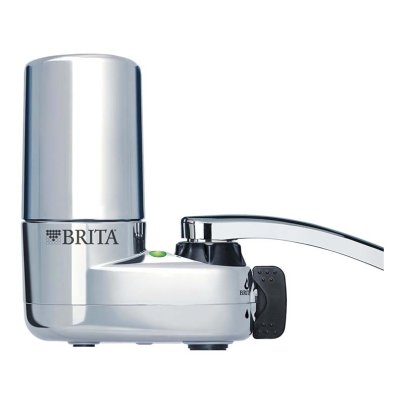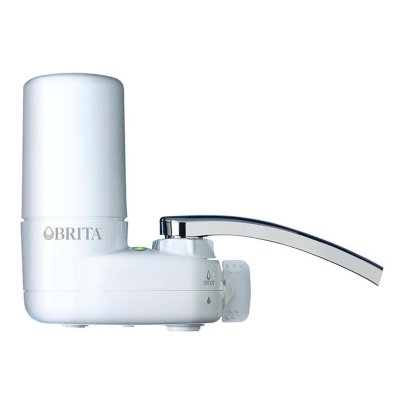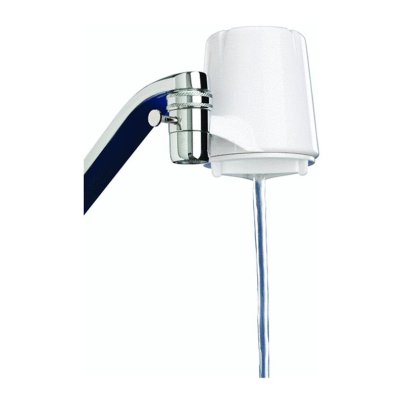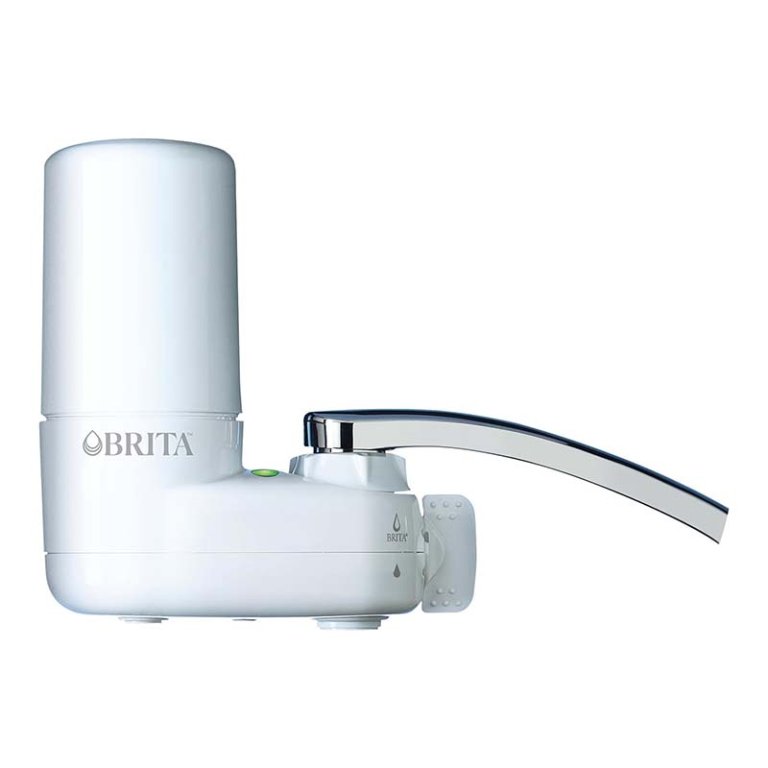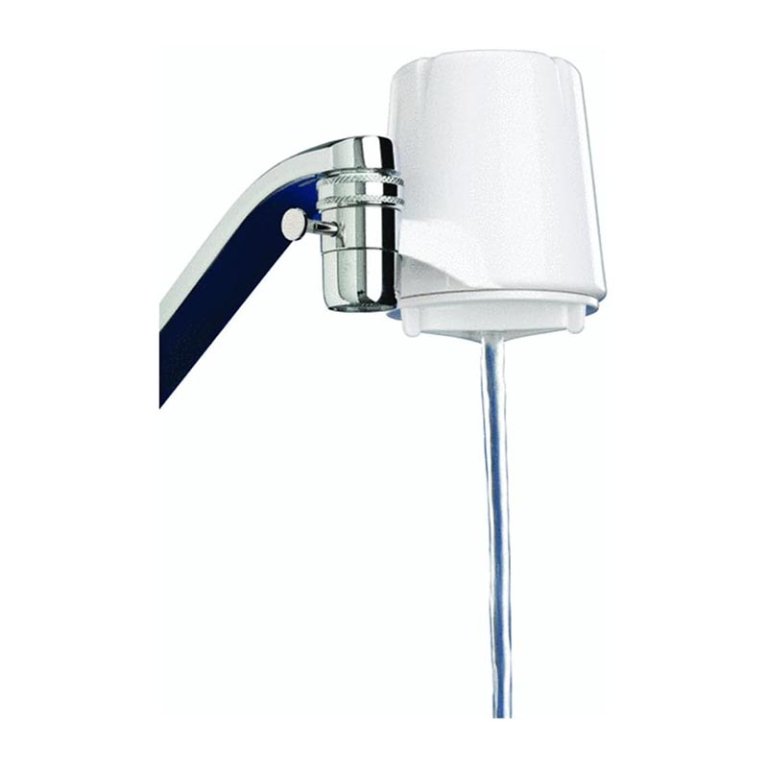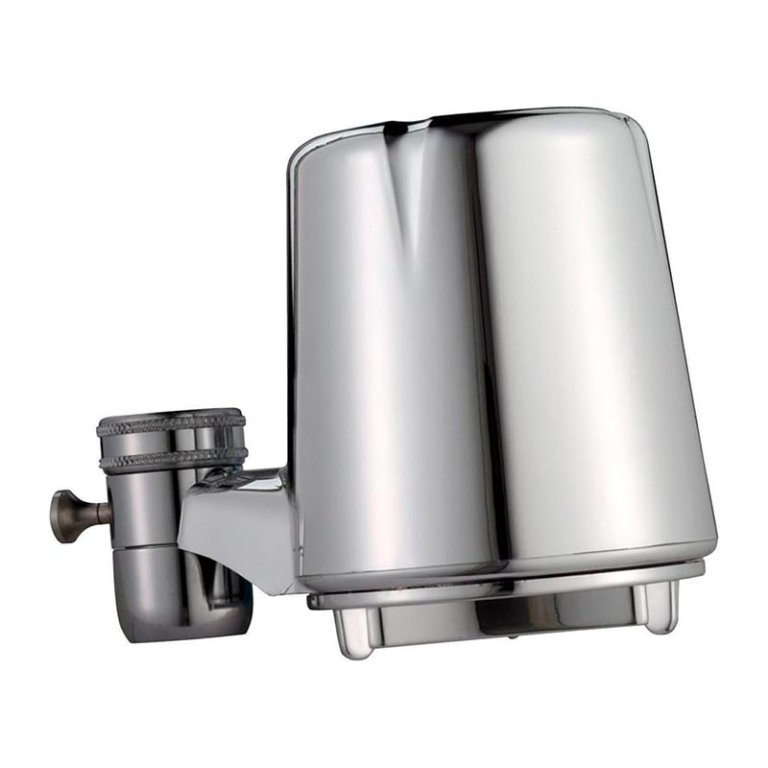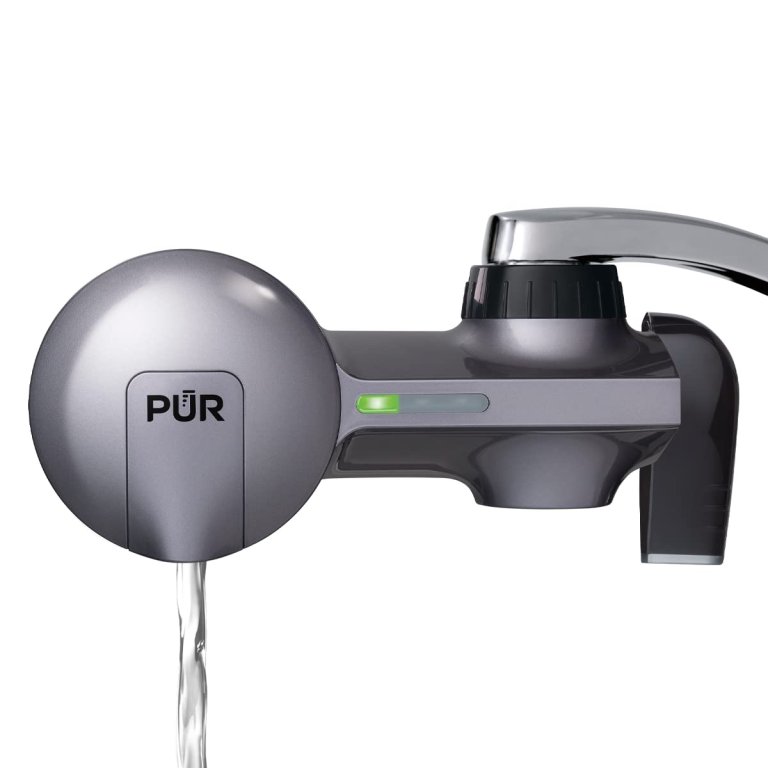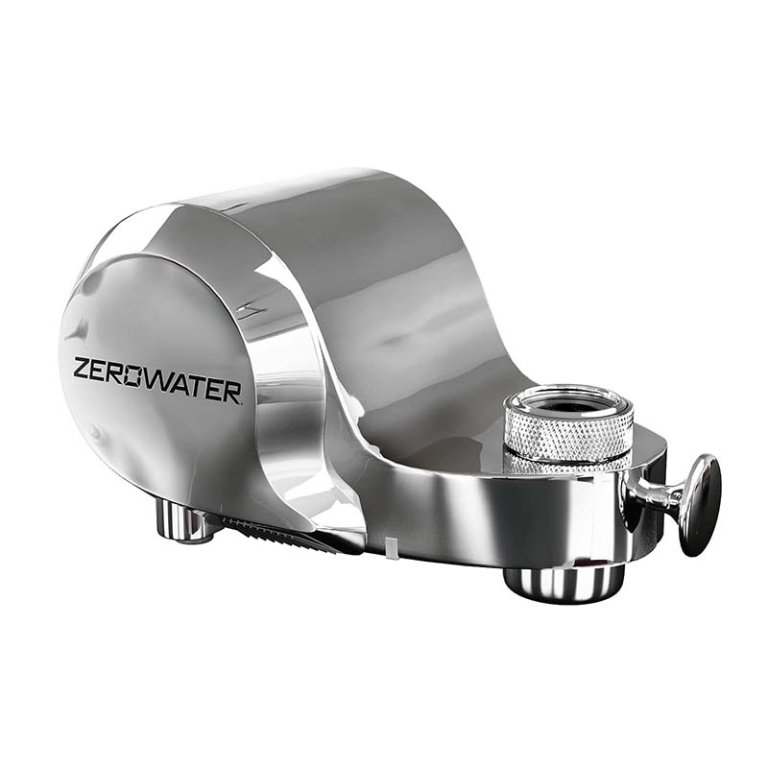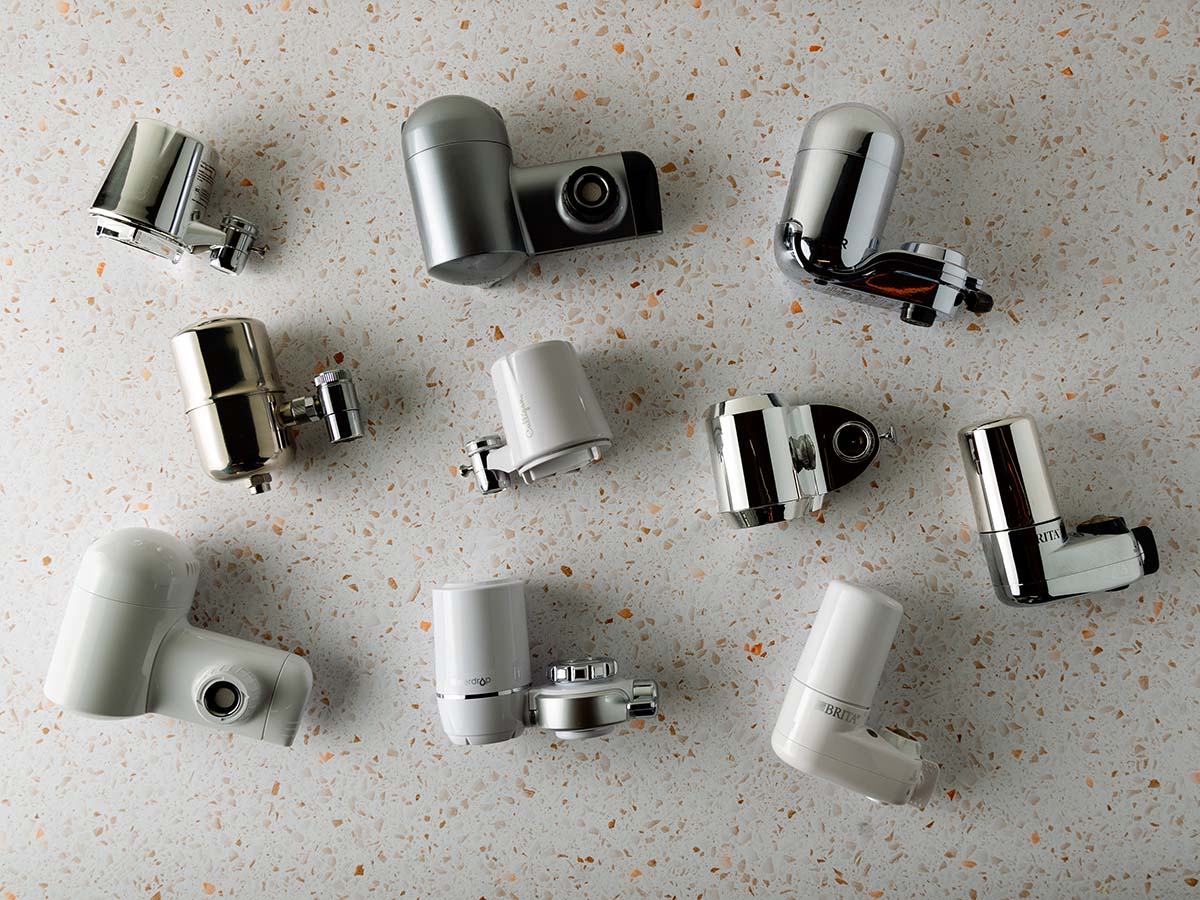
We may earn revenue from the products available on this page and participate in affiliate programs. Learn More ›
Faucet water filters are a convenient way to ensure your home has an ongoing supply of clean drinking water. Since tap water can have hundreds of pollutants, including lead and arsenic, buying and installing a water filter is an easy way to improve water quality. Still, with so many popular filters available, knowing which will fit your kitchen faucet and provide effective filtration for your plumbing can be difficult.
To aid your decision, we researched more than 40 top-rated faucet filters and chose 10 to test. We selected the Brita Elite Advanced Water Filter Faucet System as the best overall option since it’s easy to install, has a long-lasting filter, and keeps water flowing at a rate that won’t disrupt quick kitchen tasks. Read on to discover how each of the best faucet water filters performed in our tests and see which features matter most when choosing the right one for your needs.
- BEST OVERALL: Brita Elite Advanced Water Filter Faucet System
↓ Jump to Review - BEST BANG FOR THE BUCK: Brita Basic Faucet Mount Water Filter System
↓ Jump to Review - BEST COMPACT: Culligan FM-15A Advanced Faucet Mount Filter
↓ Jump to Review - BEST FOR WELL WATER: Pur PFM150W Horizontal Faucet Filtration System
↓ Jump to Review - BEST FOR LEAD: Culligan FM-25 Faucet Mount Filter System
↓ Jump to Review - BEST FOR PESTICIDES: Pur Plus PFM350V Faucet Water Filtration System
↓ Jump to Review - BEST FOR PFOS/PFAS: ZeroWater ExtremeLife Faucet Mount Water Filter
↓ Jump to Review

| Product Name | Filter Type | Maximum Flow Rate | Filter Replacement |
| Brita Elite Advanced Water Filter Faucet System | Activated carbon | 0.5 gallons per minute (GPM) | 100 gallons |
| Brita Basic Faucet Mount Water Filter System | Activated carbon | 0.58 GPM | 100 gallons |
| Culligan FM-15A Advanced Faucet Mount Filter | Activated carbon | 0.5 GPM | 200 gallons |
| Pur PFM150W Horizontal Faucet Filtration System | Activated carbon | 0.52 GPM | 100 gallons |
| Culligan FM-25 Faucet Mount Filter System | Activated carbon | 0.5 GPM | 200 gallons |
| Pur Plus PFM350V Faucet Water Filtration System | Mineral core | 0.52 GPM | 100 gallons |
| ZeroWater ExtremeLife Faucet Mount Water Filter | Carbon fiber | 0.65 GPM | 400 gallons |
Our Top Picks
Choosing the best faucet-mounted water filter will depend on which contaminants are present in your drinking water. While some municipalities have excellent water quality but suboptimal taste, others may have water that tastes just fine but shows trace levels of contamination. Read on to see which tap water filtering system would be best for your home.
Best Overall
Brita Elite Advanced Water Filter Faucet System
See ItWhat We Like
- Removes bad tastes and odors, class I particles, and 60 contaminants
- Lightweight for less wear and tear on the faucet
- Faster flow rate than most other tested products
- Free cartridge recycling with TerraCycle
What We Don’t Like
- Flow rate is constricted in unfiltered position
Specs
- Filter type: Activated carbon
- Maximum flow rate: 0.5 gallons per minute (GPM)
- Filter replacement: 100 gallons
Our Ratings: Filtration 4/5; Ease of Assembly 5/5; Ease of Filter Change 5/5; Durability 4/5; Taste 4/5
We selected the Brita Elite Advanced faucet-mounted filtration system for the top spot because it offers the best combination of certified filtration ability and ease of use at a reasonable price. It carries National Sanitation Foundation/American National Standards Institute (NSF/ANSI) 42, 53, and 401 certifications to reduce chlorine taste and odor, particles from 0.5 to 1.0 microns, and an impressive 60 contaminants with known health effects. Each filter lasts through 100 gallons, which is good for 1 to 4 months, depending on individual usage patterns.
In our tests, assembling this faucet system took less than 2 minutes, and the chrome finish on the plastic housing matched our kitchen sink nicely. The filter cartridge did not require a presoak or rinse. Instead, we simply turned on the water for a few minutes after assembly to flush the system. Once it was ready, it took 40 seconds to fill a 32-ounce water bottle, slightly slower than the advertised time of 0.58 GPM and about the middle of the pack compared to the other filters in the test group. It was one of the lightest models we tested at just 12 ounces (weighed after wetting the filter), meaning it will cause less wear and tear on faucets over time.
What our tester says: “This water filter sink attachment stands because it’s a great mix of affordable, effective, and easy to use. We appreciate that water flows through it better than through comparably or more highly certified filters, and the water it produces tastes great.”—Mark Wolfe, Product Reviews tester and writer
Read our full review: Brita Elite Advanced Water Filter Faucet System
Get the Brita Complete faucet water filter at Amazon, The Home Depot, Walmart (with 2 filters), or Target.
Best Bang for the Buck
Brita Basic Faucet Mount Water Filter System
See ItWhat We Like
- Removes lead and chlorine
- User-friendly filter-change indicator light
- Tool-free installation
- Offers free recycling program for used filters
What We Don’t Like
- Plastic components may not provide long-term durability
- Not for use with water above 100 degrees Fahrenheit
Specs
- Filter type: Activated carbon
- Maximum flow rate: 0.58 GPM
- Filter replacement: 100 gallons
Our Ratings: Filtration 4/5; Ease of Assembly 5/5; Ease of Filter Change 5/5; Durability 4/5; Taste 4/5
This affordable Brita faucet water filter has a basic white plastic design that’s resistant to corrosion and rusting, a 0.58 GPM flow rate, and an activated-carbon filter cartridge that lasts up to 4 months or up to 100 gallons of water. The no-tools-required assembly of this filter is compatible with standard kitchen faucets but cannot connect to pull-out or spray-style faucets.
Highly effective at removing lead and chlorine, this popular Brita kitchen sink water filter improves water’s taste, odor, and clarity. It comes with NSF/ANSI 42, 53, and 401 certifications for reducing 60 contaminants. In our tests, assembly and system flush took about 8 minutes, and it filled our 32-ounce water bottle in just 35 seconds. We also like that this model has a green light to indicate when the filter cartridge needs to be replaced.
What our tester says: “In testing, this model mirrored our top pick but with slightly less filtration capability. The dimensions and weight of both units were identical, and we were impressed that it still had the third-highest filtration score at a budget-friendly price.”—Mark Wolfe, Product Reviews tester and writer
Get the Brita Basic faucet water filter at Amazon or Walmart.
Best Compact
Culligan FM-15A Advanced Faucet Mount Filter
See ItWhat We Like
- Filters out chlorine, atrazine, lindane, lead, particulate matter, and odor
- Water filter lasts up to 2 months
- Faucet adapters included
- Lightweight design minimizes wear and tear
What We Don’t Like
- Only certified for 5 NSF/ANSI 53 standards and no NSF/ANSI 401 standards
- Filter valve must be activated before each use
Specs
- Filter type: Activated carbon
- Maximum flow rate: 0.5 GPM
- Filter replacement: 200 gallons
Our Ratings: Filtration 3/5; Ease of Assembly 5/5; Ease of Filter Change 4/5; Durability 4/5; Taste 4/5
Chlorine is great for keeping pools clean, but no one wants to think about chlorine levels in their drinking water. A welcome solution to this problem could be the Culligan FM-15A Advanced faucet-mount filter, which reduces chlorine as well as atrazine, lindane, lead, particulate matter, and turbidity, improving taste and odor for cleaner, fresher tap water. This tap water filter has a flow rate of 0.5 GPM at 60 PSI and lasts up to 2 months (or 200 gallons of faucet water). Plus, it comes with faucet adapters to work in tandem with most current kitchen faucets. However, as with the others we tested, it will not work with any drop-down faucet varieties.
We were impressed by the Culligan faucet filter’s ease of installation and its appreciable flow rate. We filled our quart bottle in 34 seconds, which was faster than most of the competition. We also found that the filter cartridge was pretty easy to change by unthreading the old one from the underside of the housing and twisting the new one in place. We did not like that using the system required two hands because the filtration valve had to be pulled out each time the water was turned on. Other models could be set to either a “filter” or “unfiltered” setting that stayed put whether or not the water was flowing.
Get the Culligan FM-15A faucet water filter at Amazon or Walmart.
Best for Well Water
Pur PFM150W Horizontal Faucet Filtration System
See ItWhat We Like
- Removes lead, mercury, pesticides, and over 70 contaminants
- Integrated filter-change indicator light
- Easy-to-install tool-free design
What We Don’t Like
- Slow filtration rate doesn’t match brand’s stated rate
Specs
- Filter type: Activated carbon
- Maximum flow rate: 0.52 GPM
- Filter replacement: 100 gallons
Our Ratings: Filtration 5/5; Ease of Assembly 4/5; Ease of Filter Change 5/5; Durability 4/5; Taste 4/5
This Pur product is a good option for those with a well water system because it removes up to 70 contaminants that can leach into groundwater and well water from industrial and agricultural runoff. The activated-carbon filter uses ion exchange to remove lead, mercury, and agricultural pesticides, restoring up to 100 gallons of drinking water to a safe standard before needing to be changed. If the cartridge has been installed for 3 months but hasn’t filtered 100 gallons, the manufacturer recommends replacing it anyway to prevent bacteria buildup.
In our tests, the flow rate from the PUR PFM150W did not match the manufacturer’s stated flow rate of 0.5 GPM. At 59 PSI water pressure, it took 53 seconds to fill a quart-size water bottle, but the wait could be worth it for those dealing with contaminated water. For our relatively clean water supply, we prefer a faster flowing option. The good news is that this unit delivered some of the best tasting water among all of the tested models. The filter cartridge was super easy to change, too.
Get the Pur PFM150W faucet water filter at Amazon or Walmart.
Best for Lead
Culligan FM-25 Faucet Mount Filter System
See ItWhat We Like
- Removes lead as well as the taste and odor of chlorine
- Stainless steel components for long-term durability
- Simple to install
- Faster flow than most home water filtration systems we tested
What We Don’t Like
- Automatically returns to the unfiltered position
- Not certified to remove as many pollutants as our top picks
Specs
- Filter type: Activated carbon
- Maximum flow rate: 0.5 GPM
- Filter replacement: 200 gallons
Our Ratings: Filtration 3/5; Ease of Assembly 5/5; Ease of Filter Change 4/5; Durability 4/5; Taste 4/5
If performance is the goal above all other concerns, then the Culligan FM-25 may be the right choice. It has a sleek chrome-plated finish, stainless steel plumbing connections, and a flow rate of up to 0.5 GPM. The carbon-block filter cartridge lasts for about 2 months or 200 gallons, reducing lead, atrazine, chlorine, lindane, turbidity, and bad taste to make drinking water safer for the entire family.
The durability, straightforward installation, and ease of use of the Culligan earned it high marks. We liked that the lightweight 12-ounce filter didn’t weigh down the faucet fixture, reducing wear and tear. And, while it is not certified to remove as many pollutants as some of the other tested models, it does the important task of removing lead while flowing at a good rate.
While some may appreciate the automatic-return valve stem, particularly when filtered water is only occasionally required, we saw it as a drawback with this filter. The user must pull out the stem to activate the filtration system each time they turn on the water. We preferred models that allowed us to leave the valve in filter mode and switch it off only when needed.
Get the Culligan FM-25 faucet water filter at Amazon, The Home Depot, or Walmart.
Best for Pesticides
Pur Plus PFM350V Faucet Water Filtration System
See ItWhat We Like
- Removes 70 contaminants, including lead, mercury, pesticides, and pharmaceuticals
- Easy to install
- Sleek gray finish complements most fixture finishes
What We Don’t Like
- Slowest flow rate of all tested models
- 1 pound 3 ounce weight increases strain on the plumbing system
Specs
- Filter type: Mineral core
- Maximum flow rate: 0.52 GPM
- Filter replacement: 100 gallons
Our Ratings: Filtration 5/5; Ease of Assembly 4/5; Ease of Filter Change 5/5; Durability 4/5; Taste 4/5
Residents of agricultural regions will benefit from this faucet filtration system, which can remove the traces of pesticides and other chemical pollutants that find their way to surface or groundwater sources. This Pur faucet water filter has a Mineral Core filter cartridge that can last up to 3 months or 100 gallons of filtered water before needing to be replaced. It has a 0.52 GPM flow rate and comes in six color options. This faucet-mount filter is compatible with all standard kitchen faucets, but it doesn’t work with pull-out or handheld faucets.
Reducing or entirely eliminating lead, mercury, pesticides, microplastics, and more than 70 other contaminants, the Pur water filtration system stands out for its sleek design, effortless installation, and general durability. It was easy to install and the water tasted great, but it may not be the perfect option. In our flow test, it worked at about half the manufacturer’s stated flow rate, so be prepared to wait a little longer for that deliciously clean water.
Get the Pur PFM350V faucet water filter at Amazon or The Home Depot.
Best for Pfos/Pfas
ZeroWater ExtremeLife Faucet Mount Water Filter
See ItWhat We Like
- Water Quality Association (WQA) certified to reduce perfluorooctanoic acid (PFOA) and perfluorooctane sulfonate (PFOS)—known as “forever chemicals”
- Third-party certified to eliminate up to 98 percent of lead
- One of the fastest flow rates among our test group
- Longest-lasting filter cartridge; filters up to 400 gallons
What We Don’t Like
- Certified for fewer filtration parameters than others
- One of the more expensive options
Specs
- Filter type: Carbon fiber
- Maximum flow rate: 0.65 GPM
- Filter replacement: 400 gallons
Our Ratings: Filtration 3/5; Ease of Assembly 5/5; Ease of Filter Change 4/5; Durability 5/5; Taste 4/5
The ZeroWater ExtremeLife faucet-mounted water filtration system features a sleek, low-profile design that works with most standard kitchen faucets. The high-quality carbon fiber filter is NSF/ANSI 42 and 53 certified to remove chlorine taste and odor, class I particles, and PFOA and PFOS, which are known as “forever chemicals.” It is also independently certified to reduce lead. The cartridge filters up to 400 gallons of tap water before it needs to be replaced, and the entire unit weighs just 13 ounces.
In our tests, the ZeroWater ExtremeLife faucet filter was one of the easiest to assemble, allowed a strong 25 seconds per 32 ounces fill rate, and produced great-tasting water. We knocked off a few points because it doesn’t carry certifications for removing pesticides or pharmaceuticals, but it’s a great long-lasting option for areas with known forever chemical contamination.
Get the ZeroWater faucet water filter at The Home Depot or ZeroWater.
ALSO TESTED
Unfortunately, the inexpensive Waterdrop NSF-Certified Water Faucet Filtration did not meet our testing standards as it imparted a plastic taste even after filtering 5 gallons of water. Though it’s budget friendly and has a long-lasting filter, we just couldn’t get past the poor taste it produced.
Jump to Our Top Picks
How We Tested the Best Faucet Water Filters
| Testing Stats | |
|---|---|
| Products tested | 10 |
| Time spent testing | 30 days |
| Tests performed | 6 |
| Price range | $25 to $45 |
During our research, we realized that water filter certifications only tell part of the story. While it is important to know which contaminants are present in tap water in order to choose a filter capable of removing them, user interface is equally important. A great filter inside a clunky or leaky housing, or one that filters at a slow rate, quickly becomes annoying. We trusted the certified lab results for filtration data and focused our at-home testing on practicality, ease of use, durability, and value.
We used a water pressure gauge to test the incoming water pressure at the sink faucet, which was 59 pounds per square inch (PSI). We followed each manufacturer’s assembly instructions and used the same faucet to test each filter. After a 5-minute flush with cold water, we recorded the time it took to fill a 32-ounce water bottle. We performed a blind taste comparison between unfiltered and filtered tap water. We used each model for 3 days, noting any observations related to ease of use, durability, and workflow in the kitchen. Afterward, we scored each filter 1 to 5 in each of five categories: filtration, easy assembly, easy filter changes, durability, and taste.
| Product Name | Filtration | Ease of Assembly | Ease of Filter Change | Durability | Taste |
| Brita Elite Advanced Water Filter Faucet System | 4 | 5 | 5 | 4 | 4 |
| Brita Basic Faucet Mount Water Filter System | 4 | 5 | 5 | 4 | 4 |
| Culligan FM-15A Advanced Faucet Mount Filter | 3 | 5 | 4 | 4 | 4 |
| Pur PFM150W Horizontal Faucet Filtration System | 5 | 4 | 5 | 4 | 4 |
| Culligan FM-25 Faucet Mount Filter System | 3 | 5 | 4 | 4 | 4 |
| Pur Plus PFM350V Faucet Water Filtration System | 5 | 4 | 5 | 4 | 4 |
| ZeroWater ExtremeLife Faucet Mount Water Filter | 3 | 5 | 4 | 5 | 4 |
What to Consider When Choosing a Faucet Water Filter
Before deciding on a filter, consider some important factors that can help you make the best decision, including the type of filter, material, flow rate, and installation requirements. If there are signs you need to start filtering your home’s water, understanding these features makes it easier to decide which option would be best.
Water Contaminants
Tap water can contain a wide range of contaminants, including pesticides, microorganisms, organic compounds, chemicals, pharmaceuticals, and harmful heavy metals such as lead, mercury, and arsenic. Water contaminants vary by community, so it’s essential to use a water test kit or research what’s affecting your water supply through the National Drinking Water Database created by the Environmental Working Group.
- Chlorine and chloramine are two common substances used to disinfect public water supplies. They help make water safe to drink, but if the levels of chlorine and chloramine are too high, they can cause eye and nose irritation as well as stomach discomfort. Due to their use in water treatment, these contaminants can be found in the drinking water of most communities.
- Fluoride is another chemical that some municipalities choose to add to the drinking water because fluoride, in small amounts, may be good for dental health. However, if the level of fluoride increases, it can actually cause pitting and staining of tooth enamel or even bone issues in adults who have experienced long-term exposure. Naturally occurring fluoride can also sometimes be found in groundwater sources in the western United States and around the Great Lakes regions.
- Lead leaches into the water through the public water supply when aging pipes begin to corrode. This is a common contaminant across the country because lead pipes were a popular choice for city infrastructures before it was discovered that lead is a toxic chemical that can cause neurological damage, impaired formation of blood cells, and impaired function of blood cells.
- Agricultural chemicals like herbicides, insecticides, and pesticides are used in rural communities to protect crops. However, these chemicals can seep into the groundwater, contaminating nearby wells. Contaminated well water can cause headaches, skin rash, eye irritation, cancer, endocrine disruption, and birth defects.
- Industrial chemicals are known for producing harmful runoff that can contaminate nearby well water systems and groundwater. Those who have wells will want to consider using a well water filtration system, especially if there is an industrial processing facility nearby. Contaminated well water can cause skin discoloration, nervous system damage, organ failure, developmental delays, birth defects, and reproductive issues.
Type
Always check to make sure the water purification faucet attachment you’re considering removes or reduces the contaminants you’re most concerned about. Regardless of which microscopic contaminants the product is best at eliminating, faucet-mounted filters considerably improve the taste of H2O.
- Reverse osmosis filters are the most effective option for treating home water because these systems can use more than seven different filters to remove up to 99 percent of contaminants. However, these systems are not made to be mounted to a faucet and are generally only available as under-sink water filters or those that connect directly to the incoming water supply.
- Carbon filters are commonly used in faucet-mounted products. These filters absorb and release water, trapping chlorine, pesticides, and solvents within the carbon. They aren’t as effective at removing nitrates and sodium as whole-house water filters.
- Ultraviolet filters are another type of filter that doesn’t attach to the faucet. However, connecting one of these filtration systems to the incoming water source is a good idea. The ultraviolet rays kill bacteria, parasites, and viruses. These filters are essentially useless at filtering mineral contaminants, so it’s advised to pair this system with a reverse osmosis system or a countertop water filter.
- Gravity water filters are one of the most common types of filters used in water pitcher systems. As their name indicates, these filters work by using gravity to pass water through activated carbon to remove contaminants. Some gravity filters feature ion exchange resins to capture heavy metals. Ion exchange is a chemical process that removes dissolved ionic contaminants from the water. During this process, ions are swapped for better ones that won’t degrade the quality of the water.
- Mixed-media filtration systems use multiple types of filtration. These filters can be a combination of activated carbon, reverse osmosis, gravity, minerals, and more to remove contaminants from water.
Material
Faucet water filters are typically made with either plastic or stainless steel. Some manufacturers may offer a range of different finishes, but these are usually stainless steel filters with metal plating over the original material just to give them a different look. So, the decision comes down to plastic or stainless steel.
- Plastic faucet water filters are inexpensive and resistant to corrosion and rusting. Some products are thick and durable, but the average plastic filter will need to be replaced more frequently than stainless steel filters because they don’t have the same durability.
- Stainless steel faucet water filters cost a bit more initially but last longer and tend to do a better job with fewer leaks. These filters can also blend in with the faucet and sink to match the kitchen aesthetics.
Flow Rate
Flow rate refers to the amount of water that flows through the filtered water faucet within a set period and is typically measured in gallons per minute. Whole-home water filtration systems cost more because they must be capable of filtering many gallons of water per minute, as most showers and dishwashers can use up to 5 GPM. However, faucet water filters don’t have the same water pressure demands and thus have a set flow rate of around 0.5 GPM, enough to fill up seven or eight standard glasses of water in 1 minute.
Filter Life and Usage
The filter life is typically indicated in the product information or on the manufacturer’s website. After this time, the water filter for sink use becomes less effective until it does very little except get in the way of regular faucet use. However, the total life of one filter can differ significantly from that of other, even identical products, due to usage.
When the faucet is left running, it wastes water and also reduces the filter life, forcing the user to replace the cartridge more frequently. Using the filter only for drinking water or cooking can extend its life, saving time and money.
Filter Cartridges
When the filter starts to lose its effectiveness, the entire faucet-mounted filter system does not need to be replaced. Simply remove the filter cartridge and replace it with a new cartridge. Most manufacturers also produce cartridge replacements, so finding a compatible option is generally easy.
Depending on the product, these cartridges typically have a lifespan measured in gallons of water that ranges from 100 to 1,000 gallons. After a certain amount of water has been filtered through the cartridge, it begins to lose effectiveness. Some filters also come with cartridge replacement recommendations from 1 month to 3 months so it’s not necessary to try and measure the amount of water flowing through the filter.
Style and Finish
Most faucet water filters have a plastic or stainless steel design, but this doesn’t prevent manufacturers from adding additional color and metal finishes, providing options to match the aesthetics of a home.
- Plastic filters can theoretically have a wide range of color choices because plastic is simple to dye during the manufacturing process. However, most producers offer standard kitchen and bathroom colors like black, gray, and white.
- Stainless steel filters have a sleek appearance already, but if the kitchen has bronze, copper, brushed gold, or other finishes, then finding a faucet water filter that matches may be an ideal solution. The number of finishes available for a specific product depends on the manufacturer. Some producers prefer to only make stainless steel and chrome-plated products.
Additional Features
After sorting through the nitty-gritty details of filter types, filter materials, flow rate, and filter cartridges, there are a few more things to consider before deciding on the best water filter, including filter size, filter-change sensor, and replacement filter cartridges.
- Filter size is key for people who have smaller sink areas. Oversize filters may not fit properly and could cause problems. Even with a larger sink space, some filters can look out of place simply because they dwarf the faucet. Keep in mind the scale of a sink and faucet when choosing a faucet water filter, and invest in an adaptor if necessary.
- Filter-change sensors notify the user when the filter cartridge needs to be replaced. This is typically indicated by a small light on the side of the filter that can either activate when the filter needs an immediate cartridge change or a few weeks prior, providing time to get a new cartridge before the old one is rendered useless.
- Replacement filter cartridges come in a range of different types. Costs can vary depending on the manufacturer. Look for the appropriate cartridge for a faucet water filter by checking the product information and the manufacturer’s website.
Installation Requirements
A faucet-mount attachment generally offers a quick installation. Unscrew the faucet aerator and swap in the adapter provided with the faucet-mount water filter. Models often include multiple sizes to offer options that may best fit a faucet. The body of the faucet-mount filter snaps into place.
Manufacturer instructions will cover how to check that the filter inside the model is good to go. Once installed, many offer the option to toggle between filtered and unfiltered water.
FAQs
If you’d still like more information about what type of tap water filter is best, or if you aren’t quite sure exactly how to connect the faucet water filter system, read on to learn the answers to these concerns and other commonly asked questions.
Whether you should filter tap water is a matter of personal discretion. Filtering tap water helps remove contaminants and can improve the taste, though filters have cartridges that must be changed regularly to remain effective.
Faucet filters and pitcher filters are similar in filtration capability, so the decision comes down to a few key features. Faucet filters attach to the faucet, giving an essentially unlimited supply of filtered water, though they can get in the way of regular faucet use. Pitcher filters need to be filled regularly, but the water can be kept cold in the fridge or set out on a table or a counter for easy access.
Reverse osmosis systems are generally the most effective type of water filter. They can include more than seven filtration stages and use a reverse osmosis process that allows them to remove 99 percent of contaminants from the water, including chlorine, heavy metals, pesticides, and herbicides.
Faucet-mount filters can typically be removed from the faucet so you can take them with you to a new home.
A faucet water filter isn’t designed to connect to a fridge, but it is possible to connect some water purifier systems directly to a fridge. This depends on the specific water purifier and the fridge.
You’ll want to replace faucet water filter cartridges every 2 to 3 months to ensure the drinking water is properly cleaned when passing through the water filtration system. If properly maintained, faucet-mount filters can last up to 4 years.
Meet the Tester
Mark Wolfe is a writer with an extensive background in the green industry and an avid DIYer who lives in a 50-year-old home. When he isn’t writing, he spends his time upgrading, repairing, and replacing anything and everything in his home, yard, and garden. He tests and writes reviews about hand tools, lawn care and home repair products, and outdoor living goods.
Additional research provided by Timothy Dale and Amy Lynch.
